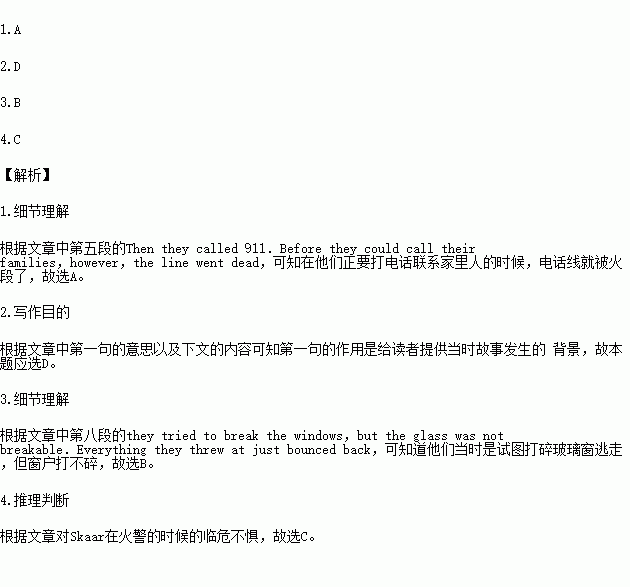题目内容
D
Trapped on the 37th Floor
Melinda Skaar wasn’t expecting any phone calls.Skaar was working late in her office at the First Interstate bank of California.By 10:45 that night she was almost ready to go home when the phone rang.
Picking it up,she heard a guard shouting.“There is a fire! Get out of there!”
Skaar didn’t panic.She figured that it was just a small fire.Her office building was huge.There were 62 floors and her desk was on the 37th floor.
Skaar called out to office mate Stephen Oksas,who also stayed late to work.But when they got to the hallway,they were met by a cloud of black smoke.Rushing back,Skaar shut the door and filled the space at the bottom of the door with her jacket to keep the smoke out.
Then they called 911.Before they could call their families,however,the line went dead.That meant that they were completely cut off from the outside world.All they could do was wait and hope someone would come to rescue them.
Minutes ticked by.Smoke began to float into the office.Soon it became hard for them to breathe.
Looking around,Skaar noticed a small workroom.It seemed to have cleaner air.So they crowded there.That helped for a while,but in time even the workroom was filled with deadly smoke.
Hopeless,they tried to break the windows,but the glass was not breakable.Everything they threw at just bounced back.
Defeated,they struggled back to the workroom.They felt weak and dizzy .Soon Skaar found Oksas had passed out.
As Skaar and Oksas lay near death,rescuers were rushing to find them.At last,at about 4 a.m.,firefighters found them.
Skaar and Oksas knew they were lucky to be alive.“Sunday is my birthday,” Skaar told a reporter.She would be turning 29.But she knew she had already got the best present possible——the gift of life.
1.What did Skaar and Oksas do when they were stopped by the fire?
A.They called their families.
B.They waited where they were.
C.They tried to run down the stairs.
D.They rushed back and shut the door.
2.The first sentence of the passage is to ____________.
A.introduce Skaar
B.get the reader’s attention
C.explain the cause of the event
D.tell the background information
3.The following helped Skaar and Oksas survive the fire except _____________.
A.calling 911 for help
B.breaking the windows to get some fresh air
C.crowding in a small workroom for clean air
D.shutting the door and keeping the smoke out with a jacket
4.What can we conclude from Skaar’s action in the fire?
A.She is cleverer than Oksas.
B.She was trained as a firefighter.
C.She remained calm in the face of danger.
D.She had had the experience of being caught in fire.
 寒假大串联黄山书社系列答案
寒假大串联黄山书社系列答案 寒假创新型自主学习第三学期寒假衔接系列答案
寒假创新型自主学习第三学期寒假衔接系列答案
